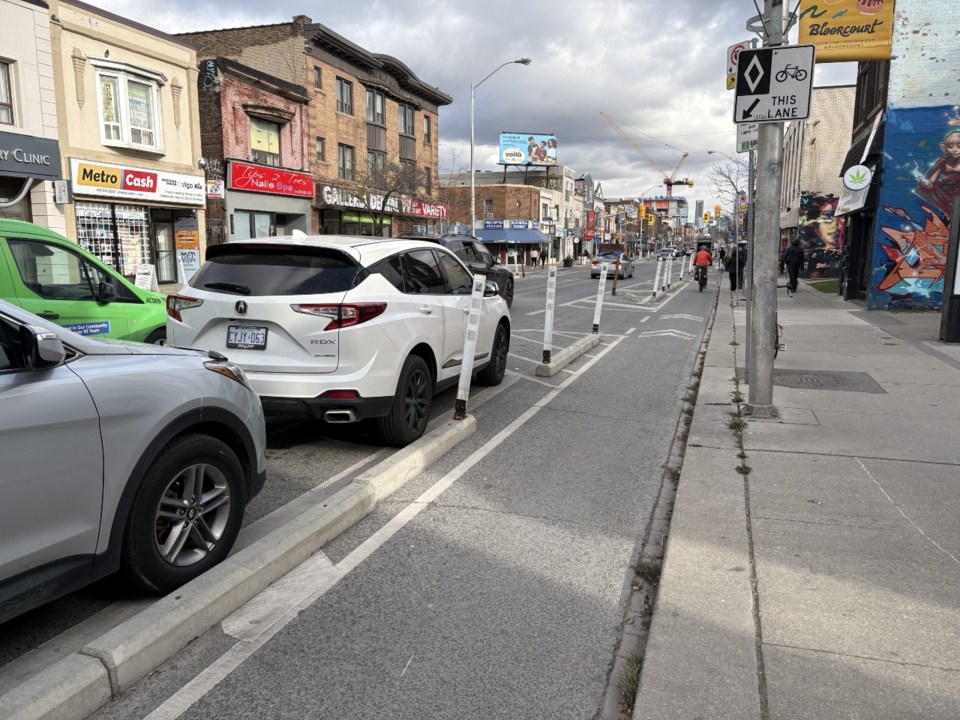Cycle Toronto has launched a Charter challenge against the Ford government’s new law that could remove three Toronto bike lanes.
The charity, along with two cyclists, Eva Stanger-Ross and Narada Kiondo, is seeking an injunction from Ontario’s Superior Court of Justice to prevent the removal of bike lanes on Bloor Street, Yonge Street and University Avenue.
The advocates have argued tearing the bike lanes out goes against the Charter’s guarantee to life, liberty and security of the person.
If the lanes are removed, “many thousands of Toronto cyclists will be forced to cycle in lanes shared with motor vehicle traffic” resulting in “heightened risk of injury and death,” Cycle Toronto argued in a statement of claim.
Gig delivery workers will be at particular risk because the nature of their work requires them to use the roads whether or not there are bike lanes, the cycling charity noted.
Bill 212, called the “Reducing Gridlock, Saving You Time Act,” forces municipalities to get the province’s approval to create new bike lanes that would remove a lane of traffic.
It also allows the provincial government to remove some or all of the bike lanes on Bloor Street, Yonge Street and University Avenue. The government has not said which portions of the lanes it plans to remove.
Cycle Toronto is only seeking to prevent the removal of the Toronto bike lanes, not to overturn the bill as a whole.
The environmental law charity Ecojustice and the Toronto law firm Paliare Roland LLP are representing the group.
“The City of Toronto and others have extensively studied the impacts of the Target Bike Lanes on road use,” the statement of claim reads, referring to the three potential areas of bike lane removal. “The Target Bike Lanes have increased road safety and reduced the risk of accidents for all road users and improved the accessibility of the roads to persons with disabilities.”
The bill also insulates the provincial government from legal action should any cyclist be hurt or killed on a street where a bike lane was removed — “a tacit acknowledgment of the safety risk the government is creating,” the charity said.
Premier Doug Ford has said the bill is aimed at speeding up drivers’ commute times, though evidence — including some prepared for Ford’s cabinet — has shown bike lanes usually have a negligible or positive impact on vehicle traffic times.
“Bill 212 puts lives at risk. It is not about tackling congestion, working with municipalities for data-driven solutions, or giving people more transportation options,” Cycle Toronto executive director Michael Longfield said in a release. “It is unprecedented jurisdictional overreach undermining local democracy that will cost taxpayers millions of dollars and jeopardize the safety of cyclists.”
Ontario Transportation Minister Prabmeet Sarkaria has said bike lanes should be on side streets, “where they make sense.”
Cycle Toronto said “there are no alternative routes or bicycle lanes that are capable of connecting cyclists to those portions of the City that are serviced by the Target Bike Lanes.”
The charity is demanding access to several documents, including the internal cabinet note reported on by TorontoToday, which said prohibiting bike lanes doesn’t solve traffic congestion.
Lawyers for Cycle Toronto are also seeking “internal reports, briefing notes, staff reports, engineering consultant reports, and memoranda,” about traffic, safety and risk analysis for the Bloor, Yonge and University corridors — and communications from the offices of Ford and Sarkaria on those topics.
Last month, Toronto councillors directed the city solicitor to report back on whether there was “potential for commencing litigation” against the province.
Mayor Olivia Chow has come out strongly against the bill but has stopped short of saying whether she would launch a legal challenge.
